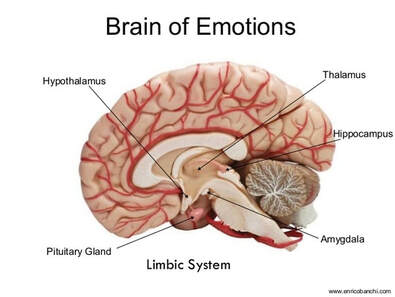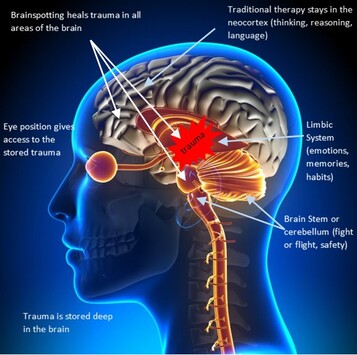What is Brainspotting?

Brainspotting (BSP) is a powerful and effective talk therapy for healing trauma and emotional distress. It is effective for a wide variety of emotional and somatic conditions, including:
BSP can also be used with performance and creativity enhancement. Its goal is to bypass the conscious, neocortical thinking to access the deeper, subcortical emotional and body-based parts of the brain where the client can access and release the stored traumas - no matter how big or little - that are contributing to or causing the emotional or physical dysregulation. The therapist, in essence, helps the client to get out of his or her own way to allow the brain to naturally do what it is wired to do--heal itself.
- PTSD
- anger
- depression
- unresolved trauma/loss
- phobias
- complicated grief
- sleep problems
- anxiety/performance anxiety
- panic disorders
- stress management
- and more
BSP can also be used with performance and creativity enhancement. Its goal is to bypass the conscious, neocortical thinking to access the deeper, subcortical emotional and body-based parts of the brain where the client can access and release the stored traumas - no matter how big or little - that are contributing to or causing the emotional or physical dysregulation. The therapist, in essence, helps the client to get out of his or her own way to allow the brain to naturally do what it is wired to do--heal itself.
How Does Brainspotting Work?
BSP makes use of this natural phenomenon of self-healing through its use of relevant eye positions that are called "brainspots." The client's own neurobiology (twitches, blinks, respiration changes, etc.) helps the BSP therapist and/or the client himself locate the brainspot (eye position), which reflexively signals the therapist that the source of the problem has been found. When the client holds that eye position for the duration of the BSP session, the healing happens naturally and automatically, with or without talking about the traumas or anxiety. Duration of treatment will vary, but BSP can help to resolve mental, emotional or physical dysregulation in as little as one session.
|
Brainspotting breaks through the trauma blocks and gets to all levels of the brain to process information stored in other areas. The traumatic experience is not forgotten; rather, brainspotting allows processing beyond the trauma block again, which changes the undesired responses (such as anxiety, irritability, panic, depression, fear, guilt, shame) it once caused, resulting in desired thoughts, feelings and behaviors without negative symptoms, improving quality of life with minimal daily effort.
|
What is Trauma?
Trauma is an emotional response to an event the person finds physically or emotionally threatening or harmful. Trauma can be anything from being bullied or being in an accident, to being abused, losing a loved one or a pet, or living through a pandemic. We all have experienced trauma, which unconsciously can overwhelm an individual’s ability to cope, cause feelings of helplessness, or diminish one’s sense of self-worth and the ability to feel a full range of emotions and experiences. Some feelings associated with traumas may include:
Our brains try to protect us by storing this unprocessed, threatening information in our midbrain, away from the prefrontal cortex that we rely on constantly for daily executive functioning. Unprocessed trauma does not rest quietly, however, and sooner or later we experience some form of emotional or physical dysregulation associated with the stored emotions of the trauma. To get to emotions - and safety - you have to go deep. This is where Brainspotting can help.
- Anger, Denial, Exhaustion
- Fear, Shame, Resentment
- Sadness, Depression, Hurt
- Guilt, Numbness, Worthlessness
- Hopelessness, Irritability, Loneliness
- Frustration, Inadequacy, Helplessness
Our brains try to protect us by storing this unprocessed, threatening information in our midbrain, away from the prefrontal cortex that we rely on constantly for daily executive functioning. Unprocessed trauma does not rest quietly, however, and sooner or later we experience some form of emotional or physical dysregulation associated with the stored emotions of the trauma. To get to emotions - and safety - you have to go deep. This is where Brainspotting can help.
Brainspotting was discovered in 2003 by David Grand, Ph.D. Over 13,000 therapists have been trained in BSP (52 internationally), in the United States, South America, Europe, the Middle East, Asia, Australia and Africa. Dr. Grand discovered that "Where you look affects how you feel." For more information, please visit www.brainspotting.com.
Testimonials
/
- 1
- 2
- 3
- 4
- 5
After one session of BSP: "I am not thinking about it as much, or at least not in a sad way. I don't focus on it. If I do, it's a quick thought in and out. I don't feel depressed anymore, and I don't cry like I used to."
--Young adult client who experienced the death of a parent as a teen and spent more than 10 years dealing with severe depression, anxiety, and complicated grief symptoms related to this loss.
/
- 1
- 2
- 3
- 4
- 5
/
- 1
- 2
- 3
- 4
- 5
“My head felt like I had random thoughts everywhere and would roam from one fire to another. After Brainspotting only 2 times, I felt like my thoughts had a filing cabinet-one for the pain and one for handling the pain. I feel like I have a confidence that I never had before.”
– Professional, 40
/
- 1
- 2
- 3
- 4
- 5
/
- 1
- 2
- 3
- 4
- 5
“After 35 years of carrying emotional baggage from childhood sexual trauma, Brainspotting allowed me to put my own thoughts and memories in order to realize it was not my fault. I now see my life not through the lens of trauma but in a new shifted paradigm that has allowed much needed healing and peace.”
– Middle-aged female
/
- 1
- 2
- 3
- 4
- 5
Busy, young professional and mom of two
/
- 1
- 2
- 3
- 4
- 5
I was experiencing stress and anxiety in a very physical way. I've always been a worrier but when I was having daily panic attacks, I knew it was time to seek a professional. In my very first session of brainspotting I found immediate relief. It was something I didn't even know existed and certainly didn't know I needed. Within a day or two of my first visit I was seeing reduced levels of anxiety and within 3 visits I was a believer! I still don't totally understand the science, but I know that I always feel better, lighter, happier when I leave a session. I feel as if I have more capacity - more capacity to help others, a weight lifted off my chest...like I can breathe deeper and have more peace in my day. For me, the effects of brainspotting were tangible and real, even measurable and it truly only took me one session to begin to notice a difference.
-Busy, young professional and mom of two
/
- 1
- 2
- 3
- 4
- 5
/
- 1
- 2
- 3
- 4
- 5
"My young son suffers from anxiety and I was shocked at just how quickly BSP worked to help him. In just one short session I saw markedly great results. I am so happy I now have a tool I can count on to help my son whenever he may need it."
-A mom of an elementary boy
/
- 1
- 2
- 3
- 4
- 5
- 0
- 1
- 2
- 3
- 4
Midway Mediation & Counseling
1095 Pingree Rd., Suite 221, Crystal Lake, IL 60014
(224) 333-0267 [email protected]
1095 Pingree Rd., Suite 221, Crystal Lake, IL 60014
(224) 333-0267 [email protected]

